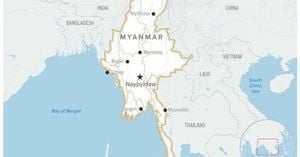In a week marked by escalating tensions across Europe and the ongoing conflict in Ukraine, two stories have thrown a spotlight on the deepening complexities of the war and the widening circle of those it draws in. On October 7, 2025, an Indian national, Majoti Sahil Mohamed Hussein, surrendered to Ukrainian forces after fighting alongside the Russian military—a dramatic development that came just as European leaders voiced growing alarm over Russian provocations, including drone incursions into European airspace.
According to a report by The Kyiv Independent, Hussein, a 22-year-old from Gujarat, India, originally traveled to Russia to study at a university. His life took a sharp turn when he was sentenced to seven years in a Russian prison on drug-related charges. Facing a grim future behind bars, Hussein accepted an offer to sign a contract with the Russian military, allowing him to avoid further punishment by participating in what Russia calls its "special military operation" in Ukraine. "I didn’t want to stay in prison, so I signed a contract for the special military operation. But I wanted to get out of there," Hussein said in a video released by Ukraine’s 63rd Mechanised Brigade.
After just 16 days of training—a staggeringly short preparation for the frontlines—Hussein was sent on his first combat mission on October 1. The mission lasted three harrowing days. Following a dispute with his commander, Hussein made a desperate decision: he approached a Ukrainian trench position, located about two to three kilometers away, put down his rifle, and surrendered. "I immediately put down my rifle and said that I didn’t want to fight. I needed help. I don’t want to go back to Russia," he explained in the video statement shared by the brigade on its Telegram channel.
The Indian embassy in Kyiv is currently working to verify the authenticity of Hussein’s account. Official sources told Business Standard that they have not yet received formal communication from Ukrainian authorities about the incident. Meanwhile, India’s Ministry of External Affairs has been pressing Russia to release and repatriate 27 Indian nationals currently serving with the Russian Army. Reports have emerged suggesting that some Indians on student and business visas were coerced into joining Russian military units deployed on the frontlines, a claim that has raised grave concerns in New Delhi.
According to official data cited by Business Standard, the number of Indians recruited by the Russian military now exceeds 150. The toll has been heavy: at least 12 Indians have been killed while fighting on the frontlines of the Ukraine conflict, 96 have been discharged by Russian authorities, and 16 are listed as missing. The issue was even raised by Prime Minister Narendra Modi during his visit to Russia last year, underscoring the seriousness with which India views the safety of its citizens caught up in the war.
While individual stories like Hussein’s highlight the human cost and international reach of the conflict, European leaders are grappling with a broader, more ominous threat. On October 8, 2025, former Ukrainian Foreign Minister Pavlo Klimkin issued a stark warning about the nature of the war now unfolding across the continent. Speaking to Online.ua, Klimkin argued that the recent surge in Russian drone incursions into European airspace is not merely a continuation of so-called “hybrid warfare”—a term often used to describe a blend of conventional and unconventional tactics such as cyberattacks, sabotage, and disinformation—but marks the beginning of a “classical war.”
“What is a hybrid war with drones? This is exactly the beginning of a classic war. Yes, it is not on a large scale, but it is a classic war,” Klimkin stated. He pointed to the recent comments of German Defense Minister Boris Pistorius, who acknowledged that, while Germany is not officially a party to the conflict, it is increasingly difficult to deny that a war—hybrid or otherwise—has begun. Klimkin criticized Europe’s response to Russian provocations as “very moderate and super cautious,” urging European leaders to move beyond mere discussion and take decisive action before the situation spirals further out of control.
Klimkin singled out France’s recent move to detain a Russian tanker, believed to be part of the so-called “Russian shadow fleet,” as a positive example of assertive action. “Well, of course there is no evidence that drones were launched from it, but still the French showed that they were in control of the process. This is actually the first precedent and an important story,” he said. The detention, carried out on October 8, was widely viewed as a symbolic but significant step in demonstrating European resolve amidst escalating tensions.
The former Ukrainian foreign minister’s remarks have added urgency to ongoing debates within European capitals about how best to respond to Russia’s increasingly bold tactics. The destruction of undersea cables, cyberattacks targeting critical infrastructure, and now the regular appearance of Russian drones in European skies have left many policymakers wondering whether the continent is prepared for the challenges ahead.
For many observers, the confluence of these events—the personal story of an Indian student-turned-soldier seeking refuge from a war he never intended to fight, and the diplomatic maneuverings of European powers trying to assert control over a volatile situation—serves as a microcosm of the broader conflict. The Ukraine war, once seen as a regional crisis, now has implications that stretch from the steppes of Eastern Europe to the corridors of power in Brussels, New Delhi, and beyond.
As the Indian government continues to press for the safe return of its nationals, and as European leaders weigh their next moves, the world watches closely. The fate of individuals like Majoti Sahil Mohamed Hussein and the broader trajectory of the conflict are intertwined, each shaping and reflecting the other in ways both tragic and profound.
The events of this week have made one thing clear: the war in Ukraine is no longer a distant or abstract concern. It is a conflict with global dimensions, drawing in people and nations far beyond its original borders—and demanding responses as complex and far-reaching as the challenges it presents.




